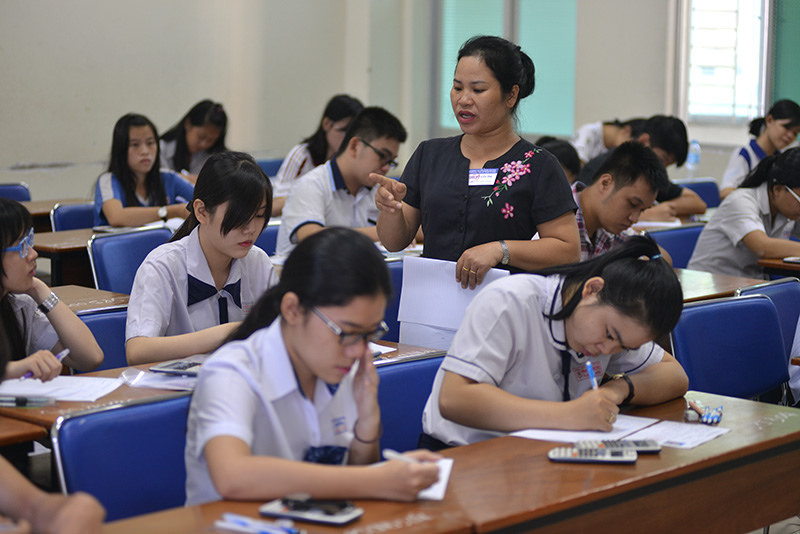Multiple challenges facing Vietnamese youth: report
Youngsters are considered as an asset to the country's prosperity, however, the Vietnamese youth are facing a range of challenges in many aspects, such as employment, education and reproductive and sexual healthcare, according to a new report released on November 22.
 |
Vietnamese youth are facing a range of challenges in many aspects. (photo for illustration: NDO)
The “Youth Well-being Policy Review in Vietnam” was released in Hanoi yesterday by the Organisation for Economic Cooperation and Development (OECD) in collaboration with the Ministry of Home Affairs (MOHA) and Germany’s Hanns Seidel Foundation. The project is part of the OECD Development Centre’s Youth Inclusion Project co-financed by the European Union, which is being implemented in nine emerging economies including Cambodia, Ivory Coast, El Salvador, Jordan, Malawi, Moldova, Peru, Togo and Vietnam.
The analysis uses an innovative multi-dimensional approach to clarify the causes of youth’s vulnerability and the factors that make up the successful transition of each country, as well as providing evidence-based policy recommendations to assist policymakers, youth organisations and other stakeholders in the design of support policies towards vulnerable youth, while attempting to take advantage of the “golden population structure” in Vietnam.
Vu Dang Minh, Director of Youth Affairs Department under the MOHA said that Vietnam and other countries around the world appreciate the role and position of the youth, considering them to be an important
source of the country. Vietnamese youth are currently defined as those aged between 16 and 30 and account for 25.7% of the population. They are a great social force significantly contributing to the cause of national construction and defence.
Over the years, Vietnam has issued many policies to care for, educate, nurture and promote its youthful population. The country also attaches great importance to the role and involvement of young people in the development and implementation of policies related to youth. Young people are not only beneficiaries but can also be advisors for government agencies to consult when developing policies.
However, there are still a lot of young people who have to drop out of school at an early age, leaving them with lack of both knowledge and skills, unprepared for work and life in the future, Minh said, adding that the issue of sexual and reproductive healthcare has not been adequately addressed for young people.
Minh commented that measuring and analysing the problems of disadvantaged youth is a prerequisite for developing policies based on credible evidence for youth. Sharing experience and exchanging information on any achievements or remaining issues in policy implementation plays an important role in policymaking for young people in both developed and developing countries.
Sharing the findings of the report, Naoko Ueda, Deputy Director of the OECD Development Centre, said that with one quarter of its population aged between 15 and 29, the highest recorded so far, Vietnam has tremendous potential for further development.
 |
Vietnamese youth are healthier and better educated than their parents (source: VNN)
Vietnamese youth are healthier and better educated than their parents and stand to benefit from positive economic prospects. The share of tertiary educated youths aged 25-29 is increasing and 70% of them have highly-skilled jobs. But these young people represent a small share of the youth population (8% aged 25-29 have a tertiary degree). The majority of young Vietnamese are disadvantaged (low-skilled and early school leavers) and live in rural areas.
The report reveals that nearly half of the employed youth are working in jobs that do not match their qualifications. The vast majority (85%) of the young labour force works in the informal sector, with no specific qualification from vocational training or higher education. Only 31% of those aged 25-29 have obtained an upper secondary degree or above. Rural youth, which make up 70% of the youth population, face additional challenges, such as access to vocational training and decent jobs. Adolescent pregnancies among ethnic minority, rural, undereducated and poor girls are three to four times higher than the national average.
The report highlights the urgent need to invest more in human capital development. Improving the quality, accessibility and relevance of vocational education and training (VET) is crucial to narrowing the “skills gap” - the difference between the skills of young people and those that employers require - especially in rural and remote areas. This requires further training for teachers, modern equipment and facilities, and improved evaluation of the impact of VET programmes. Better links between VET institutions and local enterprises would also help them to understand the labour market needs and improve the relevance of these programmes.
As the report acknowledges, youth issues are gaining prominence in Vietnam’s policy agenda, as demonstrated by the adoption of the Youth Law in 2005 and the Vietnamese Youth Development Strategy 2011-2020. For those strategic targets to be reached, a better prioritisation of programmes, more coordinated inter-ministerial efforts, and increased investment in youth programmes are essential. Sustaining Vietnam’s remarkable economic success requires that all of its youth contribute to and benefit from the fruits of the country’s growth.
Naoko Ueda recommended reforming the youth welfare policy in various aspects, striving to expand training opportunities for all young people and bridge the gap between professional skills and the needs of the labour market. Meanwhile, more investment is needed in vocational training to address the skills mismatch, particularly in rural areas. Enhancing youth participation in political and civic activities through capacity building, institutional understanding and new mechanisms is another need to support youth participation, she added./.
( VNF/NDO )
Recommended
 National
National
Vietnam News Today (Jun. 7): Prime Minister works with Estonian firms to accelerate projects in Vietnam
 National
National
Vietnam News Today (Jun. 6): Foreign Investment in Vietnam Surges in Five Months
 National
National
Vietnam News Today (Jun. 5): PM sets off for attendance at UNOC 3 in France, official visits to Estonia, Sweden
 National
National
Vietnam News Today (Jun. 4): Vietnam - Promising Candidate for Southeast Asia’s Next Powerhouse
Popular article
 National
National
Shangri-La Dialogue 22: Vietnam Highlights Some Issues of Ensuring Stability in a Competitive World
 National
National
Vietnam News Today (Jun. 3): PM Pham Minh Chinh to Attend UN Ocean Conference, Visit Estonia, Sweden
 National
National
Vietnam News Today (Jun. 2): Vietnamese Trade Mission Sounds Out Business Opportunities in United States
 National
National



